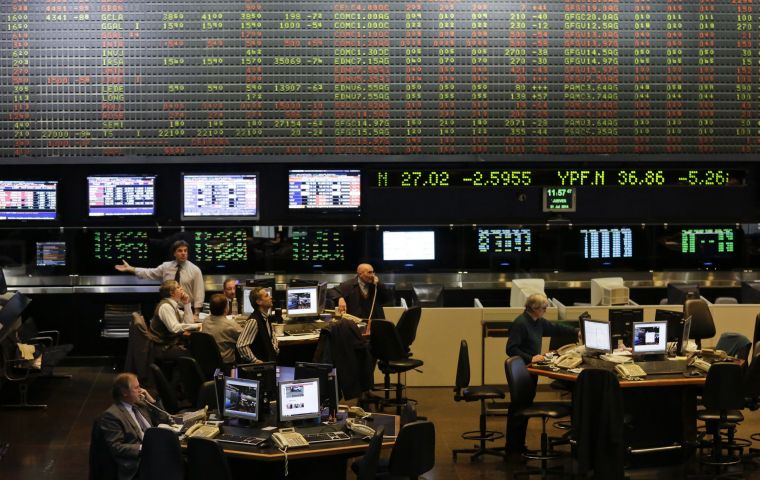MercoPress. South Atlantic News Agency
Global Index decides on Wednesday if it includes Argentina and Saudi Arabia
 MSCI will announce the results of its Annual Market Classification Review on June 20 around 2030GMT.
MSCI will announce the results of its Annual Market Classification Review on June 20 around 2030GMT.  On assuming office in December 2015, president Mauricio Macri declared Argentina open for business and introduced sweeping pro-market reforms.
On assuming office in December 2015, president Mauricio Macri declared Argentina open for business and introduced sweeping pro-market reforms. Global index compiler MSCI is considering including Argentina and Saudi Arabia in its emerging market indexes at a review of its widely-tracked benchmark on Wednesday, and could potentially announce candidates that may join its indexes in future.
MSCI will announce the results of its Annual Market Classification Review on June 20 around 2030GMT. MSCI's gauges are used by investment funds worldwide, with some US$1.7 trillion of active and passive money benchmarked against its EM indexes.
MSCI will decide if Argentina can return to the “emerging” markets from its current “frontier” segment encompassing smaller and less developed stock markets. Argentina's bourse, which currently has a market capitalization of US$ 98 billion, was relegated in 2009 after Buenos Aires introduced capital controls. But after assuming office in December 2015, conservative President Mauricio Macri declared the country open for business and introduced sweeping pro-market reforms.
In 2017 MSCI surprised markets by not promoting Argentina, saying it needed more signs that reforms were “irreversible”. Meanwhile Argentina's markets have been roiled in recent weeks after currency volatility forced Buenos Aires to ramp up interest rates to 40% and seek a US$ 50 billion lifeline from the International Monetary Fund.
In May, MSCI said the recent market rout would make it more difficult to determine whether to award Argentina emerging markets status again.
Returning to “emerging” status would see the MSCI Argentina index cut to ten from 15 constituents. The country would have a weighting of 0.6 per cent — on a par with the United Arab Emirates and Qatar. Argentina currently makes up nearly a quarter of the frontier markets index.
MSCI will decide whether to reclassify Saudi Arabia and its US$ 526 billion bourse to “emerging” from “standalone” status. The Gulf region's dominant economy opened capital markets to foreign direct investment in June 2015, initially with tough restrictions on investors outside Gulf Cooperation Council (GCC) countries.
Since launching an initiative two years ago to modernize its economy and society by 2020, Riyadh has been on a quest to liberalize investors' access. Policymakers are hoping inclusion in global equity indexes, as well as the planned privatization of state oil giant Saudi Aramco, will bring big inflows of overseas money in 2019.
Officials predict a 5% stake sale in Saudi Aramco, now expected to go ahead in early 2019, will raise US$ 100 billion. Even without an Saudi Aramco IPO, Saudi Arabia's index would have a weighting of 2.3% in MSCI's EM index — on a par with Malaysia and Thailand.
Featuring 32 stocks, Saudi would be the third-largest constituent country from the Europe, Middle East and Africa region, behind South Africa and Russia. Analysts expect an MSCI upgrade could attract around US$10 billion in passive fund flows.
If Saudi gets the nod, reclassification would happen in two steps as part of MSCI's May and August 2019 reviews.




Top Comments
Disclaimer & comment rules-

Read all commentsWe all know these qualifications are politically influenced.
Jun 20th, 2018 - 06:57 pm 0It will be interesting to see how Global Index reflects Argentina's current status of economic sinking ship when JP Morgan country risk index has been steadily climbing and set now at 564.
Surprisingly, even the business-friendly bank gave Argentina a country risk qualification of 482 in November 2015--one month shy of Macri's assumption of the country's presidency.
Perhaps another one of the Mysteries of Udolpho.
Commenting for this story is now closed.
If you have a Facebook account, become a fan and comment on our Facebook Page!